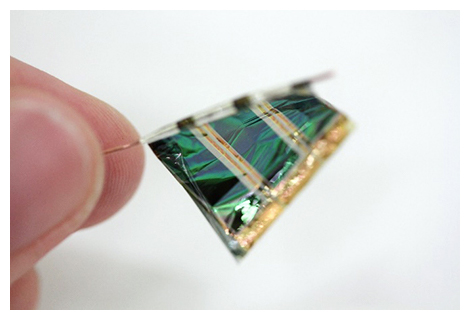Mar 10 2020
Researchers at the RIKEN Center for Emergent Matter Science and RIKEN Cluster for Pioneering Research have collaborated with international partners and successfully developed an ultrathin organic solar cell that is both durable and highly efficient.
 Ultra-thin organic solar cell. Image Credit: RIKEN.
Ultra-thin organic solar cell. Image Credit: RIKEN.
By employing an easy post-annealing process, the team developed a flexible organic cell that degrades below 5% over 3,000 hours under atmospheric conditions and, at the same time, has an energy conversion ratio—the main indicator of solar cell performance—of 13%.
Organic photovoltaics are regarded as a propitious alternative to silicon-based conventional films, being more affordable and eco-friendly to synthesize. Ultra-thin flexible solar cells are specifically appealing as they are capable of offering large power per weight and can be utilized in a range of useful applications like powering wearable electronics and as actuators and sensors in soft robotics.
But these ultrathin organic films are comparatively more efficient, usually possessing an energy conversion ratio of about 10% to 12%. This value is considerably lower when compared to the ratio in silicon cells, which can be as high as 25%, or of rigid organic cells, which can be up to around 17%.
Moreover, ultrathin films have the tendency to degrade quickly upon exposure to heat, oxygen, and sunlight. Although scientists are making efforts to develop ultrathin films that are both durable and energy-efficient, it is usually a challenging trade-off.
In a study reported in the Proceedings of the National Academy of Sciences of the United States of America, the research has successfully demonstrated that an ultrathin cell can be efficient as well as durable. The group started its study with a semiconductor polymer for the donor layer, which was created by Toray Industries, Inc., and performed experiments with a new concept of using a non-fullerene acceptor, which enhances the thermal stability.
Additionally, the team experimented with a simple post-annealing process, which involved heating the material up to 150 °C following an initial annealing at 90 °C. Hence, this step proved to be crucial in enhancing the device’s durability by developing a steady interface between the layers.
By combining a new power generation layer with a simple post-annealing treatment, we have achieved both high energy conversion efficiency and long-term storage stability in ultra-thin organic solar cells.
Kenjiro Fukuda, Study Author and Senior Research Scientist, RIKEN
Fukuda continued, “Our research shows that ultra-thin organic solar cells can be used to supply high power in a stable way over long periods of time, and can be used even under severe conditions such as high temperature and humidity. I very much hope that this research will contribute to the development of long-term stable power supply devices that can be used in wearable electronics such as sensors attached to clothes.”
The study was headed by scientists at RIKEN and was performed in collaboration with researchers from Monash University, the University of Tokyo, and the University of California at Santa Barbara.